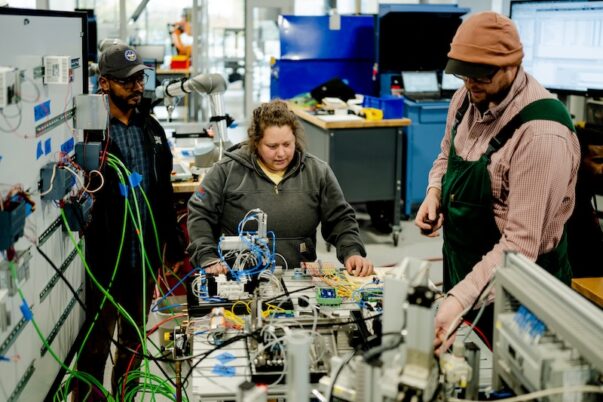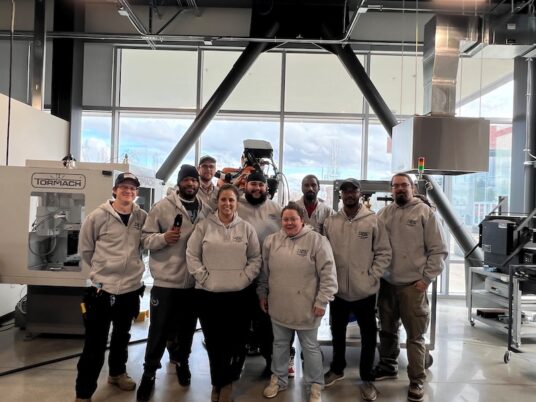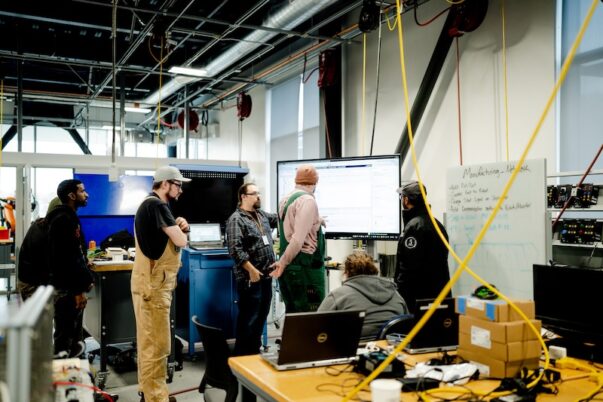CPTC and Trident Seafoods bridge a critical workforce gap
By Jean Borst
Trident Seafoods – the largest vertically integrated seafood harvesting and processing company in North America – faced a challenge. Like many employers, the company was struggling to keep pace with the growing demands of automation – and bridge a gap between cutting-edge technology and the people who operate and maintain it.
Workers in its Alaska processing facilities needed upskilling, but there weren’t any established programs in the state that could conveniently meet the need. Alaska high schools were only beginning to develop relevant curricula, and nothing was in place to support the kind of specialized training Trident was seeking.
So, the company began looking beyond Alaska’s borders. That search led them to Clover Park Technical College (CPTC).
“We discovered that CPTC’s Mechatronics program was a really good fit for us,” said Stephanie Anderson, Trident’s Facilities Engineering Project Manager. “Our learning and development team got to work to see what would be possible.”
Tailor-made training to meet industry demand
The Mechatronics program combines electrical, mechanical and computer engineering skills to prepare students not only for careers in advanced manufacturing, automation and industrial maintenance, but also to upskill existing workers so they can grow and stay in those careers. Students learn to troubleshoot complex systems, work with programmable logic controllers (PLCs), and maintain robotics and automated machinery – skills that mirror Trident’s technical operations.

CPTC partnered with Trident to adapt its existing Mechatronics curriculum to create an accelerated program designed specifically for the company’s workforce.
“This contextualized approach is critical to making the program work and requires a close, collaborative relationship with the company,“ CPTC Mechatronics Instructor Mike Mavor said. “Students take the same courses and meet the same outcomes as our regular enrollees, but we map that content to specific scenarios and activities that Trident employees are likely to encounter.”
It’s a new twist on a hands-on, industry-focused training model that CPTC is known for – ensuring employees not only have the academic knowledge they need, but also the practical skills they can apply immediately.
“We want all our students to walk away with the ability to do and perform from day one on the job,” said CPTC Dean of Instruction for Advanced Manufacturing Dr. Claire Korschinowski. “We’re putting people into roles that will sustain themselves and our communities.”
A game-changer for Trident’s operations
“CPTC tailored the program around our needs – including scheduling around our salmon season,” Anderson said. “They’ve been incredibly flexible, offering times that work with our employees’ availability.”
The training is delivered in three intensive 21-day sessions, with employees completing two Mechatronics courses per session. Between sessions, employees return to their jobs and apply their new skills in real time.
After completing all three blocks, participants receive a Mechatronics Flex 20 Certificate, a CPTC-developed credential designed to meet specific industry needs.
Due to the program’s early success, CPTC and Trident developed an advanced “All Stars” curriculum that includes six additional Mechatronics courses.
Launched in fall 2023, the program is offered at no cost to employees. Trident covers housing and meals and pays participants for 40 hours a week while they attend class.
Real results, real impact
“Technology is always changing, and to keep up, we need to invest in our people and give them tools to move us forward,” Anderson said. “The CPTC model is so great because it allows us to retain really good employees who understand where we’ve been and where we need to go.”
“Continued education, especially as an electrician, is super important,” said Monty Myrtle, Trident Seafoods Lead Journeyman Electrician. “Thanks to Trident investing in me, I’ve got a whole new toolbox. It’s knowledge I never would have gained otherwise. And CPTC did a great job recreating real-life scenarios.”
The employee response has been overwhelmingly positive. An internal Trident survey showed that participants found the program to be inspiring, effective and directly applicable to their jobs.
To date, 10 Trident employees have completed the initial training, 6 have finished the All-Stars curriculum and 5 more are currently enrolled.
Trident has sent a variety of employees through the CPTC training, including electricians, PLC and refrigeration technicians, and even a member of its management team.
“Mechatronics covers all aspects of the trades sector now, and everyone needs to know this information,” Anderson said.

A model for the modern workforce
Together, CPTC and Trident Seafoods are demonstrating how targeted training and strong partnerships can bridge critical industry skills gaps. While rooted in Alaska, this unique collaboration offers a scalable model for the future.
Looking ahead, the college plans to offer contextualized Mechatronics training to more industry partners in and beyond the Puget Sound region, with other CPTC programs potentially adopting the model. That’s a big win for businesses, employees and the college.

For industry partners and their workforce, the model:
- Helps companies to keep up with evolving technologies while retaining top talent.
- Offers a cost-effective option to upskill employees.
- Nearly eliminates the cost of returning to school for employees.
For CPTC, the collaboration:
- Delivers direct, near real-time industry feedback to keep curriculum relevant.
- Provides insights from students and managers on workplace performance improvements.
- Expands access to a broader student pool, including out-of-state learners – fueling program growth and faculty hiring.
If your organization is interested in partnering with CPTC, please contact Claire Korschinowski at 253-589-5516 or claire.korschinowski@cptc.edu.